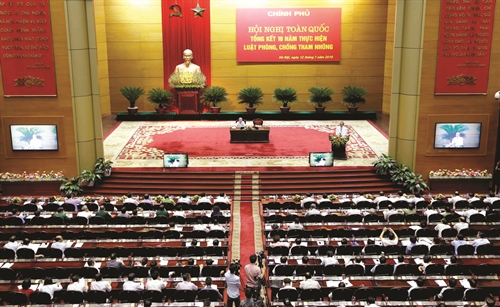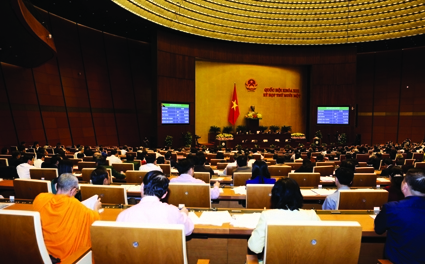A large number of legal documents focusing on resolving difficulties and removing obstacles in investment and business activities were issued over the past six months.
This is noted in a report recently released by the Ministry of Justice reviewing the Government’s lawmaking work in the first half of 2016 and identifying tasks for this work in the second half of the year.
According to the report, the Government had shown impressive efforts over the past six months to draft and issue dozens of legal documents providing business and investment conditions under the Investment Law and Enterprise Law.
These documents include 49 decrees guiding the Investment Law and one decree detailing conditions for investment and business activities regulated by the Law on Cyber Information Security. By June 28, 49 decrees were enacted by the Government while the remaining one is being appraised by the Ministry of Justice.
Addressing the cabinet’s June regular meeting, Prime Minister Nguyen Xuan Phuc said these decrees were drafted strictly according to the process established by law, but not mechanically upgraded from the current circulars.
These regulations, he said, fully institutionalized the Party’s and State’s policies, guidelines and directions. Their drafting process was public and transparent, involving the active participation of the Vietnam Chamber of Commerce and Industry, business associations, the press, specialists and the people.
In the first half of the year, the Government also considered and approved five draft laws and ordinances for submission to the National Assembly, including three bills on irrigation, railway and amendments to the Law on Technology Transfer, and two draft amended ordinances on plant varieties and animal breeds.
Besides, the National Assembly passed seven laws in April and its Standing Committee adopted one ordinance in March this year.
The report also points to the chronic delay in the drafting of laws and ordinances and in the issuance of implementing regulations, which the Government should try its best to address.
Three bills on management and use of weapons, explosives and supporting tools; foreign trade; and planning could not be presented on time to the Government for consideration, the report says.
Meanwhile, the Government proposed rescheduling the submission of the two bills on demonstrations and national defense to the next year and removing the bill on certification from this year’s legislative program.
Delay can also be seen in the issuance of implementing regulations. In the first half of 2016, ministries and sectors were tasked to prepare and submit to the Government and the Prime Minister for issuance 251 legal documents, including 169 guiding the implementation of the laws which became effective before or on July 1, and 82 documents detailing 12 laws which will take effect after that date.
However, by the end of June, out of the first 169 documents, only 55 had been issued, accounting for 32.5 percent. As for the other 82 documents, only one had been released.
In the last months of the year, ministries and sectors will have to present 12 draft laws and ordinances to the Government, and the Government will have to submit 23 drafts to the National Assembly for consideration. They will also be responsible for completing the delayed documents.
Of the remaining 114 documents to be issued to guide the laws and ordinances which came into force before or on July 1, the Ministry of National Defense has the highest number, 42, followed by the Ministry of Public Security, 22; the Ministry of Natural Resources and Environment, 10; and the Ministry of Health, 9.
As for 81 documents detailing the laws or ordinances that will take effect after July 1, ministries and sectors will have to elaborate and submit them to competent authorities for promulgation to ensure the enforcement of the laws or ordinances they detail.
These documents include 14 documents detailing the Law on Export Duty and Import Duty (effective this September) and 34 documents detailing the Law on Charges and Fees, the Press Law, the Pharmacy Law and the Law on Children (effective on January 1 next year), among others.
The Prime Minister has ordered the drafting agencies to pay special attention to and prioritize resources for their tasks and permitted them to apply fast-track procedures so as to speed up drafting, appraisal and verification work, according to the report.- (VLLF)









